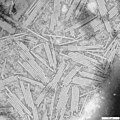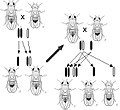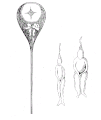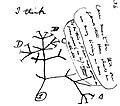Portal:Biology
Introduction


Biology is the scientific study of life. It is a natural science with a broad scope but has several unifying themes that tie it together as a single, coherent field. For instance, all organisms are composed of at least one cell that processes hereditary information encoded in genes, which can be transmitted to future generations. Another major theme is evolution, which explains the unity and diversity of life. Energy processing is also important to life as it allows organisms to move, grow, and reproduce. Finally, all organisms can regulate their own internal environments.
Biologists can study life at multiple levels of organization, from the molecular biology of a cell to the anatomy and physiology of plants and animals, and the evolution of populations. Hence, there are multiple subdisciplines within biology, each defined by the nature of their research questions and the tools that they use. Like other scientists, biologists use the scientific method to make observations, pose questions, generate hypotheses, perform experiments, and form conclusions about the world around them.
Life on Earth, which emerged over 3.7 billion years ago, is immensely diverse. Biologists have sought to study and classify the various life form, from prokaryotic organisms such as archaea and bacteria to eukaryotic organisms such as protists, fungi, plants, and animals. These organisms contribute to the biodiversity of an ecosystem, where they play specialized roles in the cycling of nutrients and energy through their biophysical environment. (Full article...)
Selected article -
The eukaryotes (/juːˈkærioʊts, -əts/ yoo-KARR-ee-ohts, -əts) constitute the domain of Eukaryota or Eukarya, organisms whose cells have a membrane-bound nucleus. All animals, plants, fungi, seaweeds, and many unicellular organisms are eukaryotes. They constitute a major group of life forms alongside the two groups of prokaryotes: the Bacteria and the Archaea. Eukaryotes represent a small minority of the number of organisms, but given their generally much larger size, their collective global biomass is much larger than that of prokaryotes.
The eukaryotes emerged within the archaeal kingdom Promethearchaeati, the phylum Promethearchaeota and the class Heimdallarchaeia. This implies that there are only two domains of life, Bacteria and Archaea, with eukaryotes incorporated among the Archaea. Eukaryotes first emerged during the Paleoproterozoic, likely as flagellated cells. The leading evolutionary theory is they were created by symbiogenesis between an anaerobic Promethearchaeati archaean and an aerobic proteobacterium, which formed the mitochondria. A second episode of symbiogenesis with a cyanobacterium created the plants, with chloroplasts. (Full article...)
Selected picture -

Major topics
Selected biography -
Jared Mason Diamond (born September 10, 1937) is an American scientist, historian, and author. In 1985 he received a MacArthur Genius Grant, and he has written hundreds of scientific and popular articles and books. His best known is Guns, Germs, and Steel (1997), which received multiple awards including the 1998 Pulitzer Prize for general nonfiction. In 2005, Diamond was ranked ninth on a poll by Prospect and Foreign Policy of the world's top 100 public intellectuals.
Originally trained in biochemistry and physiology, Diamond has published in many fields, including anthropology, ecology, geography, and evolutionary biology. In 1999, he received the National Medal of Science, an honor bestowed by the President of the United States and the National Science Foundation. He was a professor of geography at UCLA until his retirement in 2024. (Full article...)
General images -
Did you know -

- ... that the p19 protein (dimer pictured) evolved in an arms race between plants and viruses?
- ...that there are about a million nephrons in a human kidney?
- ... that the semi-aquatic grasshopper Cornops aquaticum is being trialled in South Africa as a biological control agent for the invasive water hyacinth?
Things you can do
Related portals
Biology portals
Categories

Anatomy - Anthropology - Astrobiology - Biochemistry - Bioengineering - Bioinformatics - Biotechnology - Botany - Cell biology - Conservation biology - Developmental biology - Ecology - Environmental science - Evolutionary biology - Genetics - Mathematical biology - Medicine - Microbiology - Immunology - Molecular biology - Mycology - Neuroscience - Paleontology - Palynology Parasitology - Pharmacology -
Phylogenetics - Physiology - Systems biology - Taxonomy - Toxicology - Virology - ZoologyMore topics
WikiProjects

WikiProjects connected with biology:
A complete list of scientific WikiProjects can be found here. See also Wikispecies, a Wikimedia project dedicated to classification of biological species.
Associated Wikimedia
The following Wikimedia Foundation sister projects provide more on this subject:
-
Commons
Free media repository -
Wikibooks
Free textbooks and manuals -
Wikidata
Free knowledge base -
Wikinews
Free-content news -
Wikiquote
Collection of quotations -
Wikisource
Free-content library -
Wikiversity
Free learning tools -
Wiktionary
Dictionary and thesaurus



























































